Geoff Nelder's Blog, page 4
September 5, 2021
#Blog for Ira Nayman’s BAD ACTORS
Leg 4 of a blog tour for Ira Nayman organised by Mark Iles.
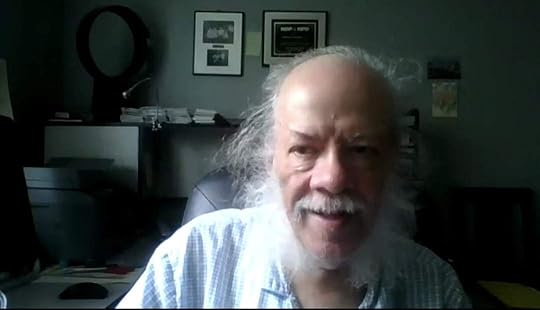 It’s my privilege to give this blog over to a writing pal over in Canada. I’ve long enjoyed his surreal books on alternate realities and the way Ira Nayman takes characters and pushes them over the limit is downright outrageous, hilarious and I’m envious.
It’s my privilege to give this blog over to a writing pal over in Canada. I’ve long enjoyed his surreal books on alternate realities and the way Ira Nayman takes characters and pushes them over the limit is downright outrageous, hilarious and I’m envious.
His new book is titled: Bad Actors: The Multiverse Refugees Trilogy: Second Pi in the Face How can you not love just the title and be compelled to read it?
BIO Firstly a spot on who Ira Nayman is.
Ira Nayman is a figment of the imagination of a lawn chair named Francois le Granfalloon. Francois has imagined a rich life for his character Ira featuring the publication of seven novels by Elsewhen Press, the most recent being called Bad Actors. Francois’ creation has been updating a web site of political and social satire, Les Pages aux Folles, for 19 years. In addition to this, imaginary Ira has a PhD in communications from McGill University and was a regular contributor to Creative Screenwriting magazine. Ira was also the editor of Amazing Stories magazine for two and a half years, but Francois is thinking that that may strain credibility, so he may remove it from his imaginings. All of his friends on the patio have urged Francois to write this down before he forgets it, but, being a lawn chair, he doesn’t have the hands to do it…
BAD ACTORS a blurb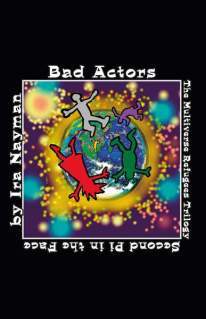
In You Can’t Kill the Multiverse (But You Can Mess With its Head), Ira Nayman’s second novel published by Elsewhen Press, a madman develops a machine which he hopes will destroy the multiverse. When he sets it off, nothing seems to happen. Not content with this state of affairs, Doctor Alhambra, the chief scientist for the Transdimensional Authority (which monitors and police traffic between universes) creates an alarm system that will alert him if any of the universes in the known multiverse should start to show signs of collapse.
In Good Intentions: The Multiverse Refugees Trilogy: First Pie in the Face, the sixth novel in the Transdimensional Authority/Multiverse series, the alarm goes off. The universe that is in imminent danger of collapse contains billions of sentient beings; the Transdimensional Authority develops an ambitious plan to help as many of them immigrate to stable universes as possible before their universe dies. Good Intentions follows the first alien immigrant’s journey to Earth Prime.
Bad Actors: The Multiverse Refugees Trilogy: Second Pi in the Face, takes place two years later. Tens of thousands of aliens have immigrated to Earth Prime, with mixed results. Some have been welcomed and aided by their human hosts. Others have been vilified, exploited and attacked. Just another day in the multiverse…
Reading a book by Ira “is like going head-to-head with an selection of thirty three and a third disconnected Wikipedia entries filtered through seven layers of artesian coffee filters woven from at least three more fibers than permitted by the historic laws of any major religion in a blender made of a strange kind of cotton candy spun from titanium anodized in fairground colours with blades made of live sharks while simultaneously tap-dancing to a Steve Reich composition based on the absolute value of the square root of pi. In other words, simply and elegantly the most entertaining way ever invented to invert your brain over a platter prepared with roasted apples and a variety of field mushrooms for your own delighted consumption.” – Jen Frankel, editor, Trump: Utopia or Dystopia, author, Undead Redhead.
The previous excerpt of Ira’s latest novel is at sarahudohgrossfurthner.com/3635-2/
Excerpt Prologue
What’s the Big Idea?
Ideas are living things.
Ideas grow. Start with a simple idea: “I am hungry.” At first, it is one idea competing in your brain for attention, easy to ignore. It grows more insistent: “Hey, I’m hungry.” It pushes out thoughts of whether there’s a stain on your shirt or if it’s worth picking up that book instead of continuing to watch television. Over time, the idea grows even more insistent: “Hey! I’m hungry!” Like a dog sniffing around your private parts, the idea is now too big to ignore.
Ideas feed off their surroundings. The idea “I am hungry,” for example, may feed off the rumbling in your stomach, or a lack of energy. If you are watching television and come across an ad for nacho dip, it could feed the idea. If you look around your den while watching television and see empty wrappers from candy bars past strewn all about the place, the idea might start to get ideas of its own. Feeding ideas helps them grow.
Ideas breed. Start with the idea: “I am hungry.” This spawns the idea, “I should eat something.” This spawns the idea, “What is there to eat?” This spawns the idea, “Maybe I should check the fridge.” This spawns the idea, “Yes, let me check the fridge.” Four generations of ideas later, you may finally get off the couch.
Ideas need room to breath. The idea “I am hungry,” won’t get much traction if it is competing in your mind for attention with other ideas such as: “Have I seen this episode of Attic Thumpers before?”; “Is it true love this time, or just a little indigestion?”; “What is that smell?”; “If the weather is better tomorrow, I should go for a run…;” “What is that lump on the couch? Have I bust a spring from sitting here so long?”; “No, really, what is that smell?”; “Aww, who am I kidding? If the weather is better tomorrow, I’ll keep binge watching Attic Thumpers – talk about addictive!”; and, “Where am I going to put that bronze statue of a baby’s arm holding an apple?” Starved of the oxygen of attention, the idea “I am hungry,” could die before it is acted upon.
Ideas move. You’re in the den with your children, watching television, and you say, “I should eat something.” Your son son posts a message on Farcebook, “My dad should eat something.” It is liked twenty-three times and reposted seven times, twice by two of his fiends in Hong Kong. Your daughter tweeps, “My dad should eat something. lolz” This gets two hundred fifty-seven retweeps, including a hundred forty-nine from Russia (at least seventeen of which are verifiable human beings). As you can see, ideas can travel around the world before dad has a chance to get his eating boots on.
Ideas are living things. But that’s only the beginning.
Ideas compete for approval. You start with the idea: “I want pizza.” This is immediately countered by the idea: “I want a hamburger and fries.” Something inside you might try the compromise idea: “I want a hamburger and fries…on my pizza!” “That’s what ground beef and fried potatoes are for,” the first idea will counter. “Order a pizza!” “Mustard and relish are really gross on a pizza,” the second idea would argue. “Go out for a hamburger!” “Pizza!” “Hamburger!” “Pizza!” “Hamburger!” Falafel!” “Falafel?” “Hey! It’s a compromise, right?” The back and forth of intellectual competition and compromise: that’s how you end up eating something you didn’t really want and don’t even especially like. Although this battle of ideas may appear to be resolved relatively quickly, it will reappear in the morning (with the cereal versus pancakes debate), and pretty much every mealtime thereafter.
As they do in individual minds, ideas compete among groups. The idea, “We’re hungry!” can find itself countered by the idea, “So, eat something.” The idea, “But we cannot afford to buy food!” is one response. This is countered by the idea, “So, okay, don’t eat anything.” “But we’re hungry!” “Oh, would you please make up your minds_” Unlike the battle of ideas within individuals, the battle of ideas between social groups can take forever to be resolved…if it ever is.
This is a story about how good intentions are overtaken by bad ideas. You may want to finish eating before you start reading…
The next excerpt in this blog tour will be on the blog of writer Maighread Mackay BLOG | maighreadmackay (mhefferman.ca)
Questions put to Ira by Geoff Nelder. Expect zany, alternate answers.
1) I recall the brave Elsewhen published Welcome to the Mulitverse in 2012 where the reader was forced to laugh in several dimensions. They clearly don’t think you’re a pi in the face author for their business. Have you ever had to put trousers on and meet your publishers face to face or zoom to zoom? If you did, how ‘alternate’ would you dress?
I am Canadian and Elsewhen is British, so our opportunities for face to face (or pants to pants) communications have been limited. I did go to England for Eastercon to promote the release of Welcome to the Multiverse (Sorry for the Inconvenience) , and I will never forget my first face to face meeting with my publisher. It was at the opening ceremonies of the convention, which were held in a huge hall with two doors. Thinking they knew me because they had seen the author’s photo I had provided them with, Peter Buck was stationed at one door and Alison Buck was stationed at the other, hoping to corral me as people left the hall. I believe Alison was the one who pulled me aside and introduced herself.
And we all lived happily ever after.
I have a clown costume that I should wear to conventions more. The funny thing about it is that I only bought one piece of it. The pants are black with stars and comets and other things painted on them. They were born a regular pair of pants, but I helped a friend paint her room when we were younger, and completely ruined them. Or, so I thought. My friend, a painter, asked me to give them to her to work on, and that’s how they became celestial. The costume includes a shirt made up of differently coloured and shaped triangles which can pass for motley if you squint. It was a miscalculation on the part of my mother, who brought it back for me from Vegas under the mistaken impression that it would brighten my wardrobe. There is a hideous tie that clashes with the shirt (although, to be fair, almost any tie would clash with that shirt), the origins of which I do not remember. and there is a pair of a running shoes that have been so worn the soles are halfway broken off. The only part of the costume I bought was a jester’s cap with three bells.
Some people wear no pants to Zoom meetings; I wear clown pants. Potato rhinocerus.
2) Your tomes have convinced me of the existence of multiverses. Do all your characters have to believe in them too, or do you allow one to be in denial?
All of my characters believe in the multiverse, just like you and I believe in oxygen or The Pet Shop Boys. I rather like the idea of a character who doesn’t believe in the multiverse, though, so I may have to ste – ahem, borrow it from you.
That having been said, I’m not sure that I believe in the multiverse, and, even if it did exist, that there ever would be a way of travelling between universes. Fortunately, I don’t have to believe in it; it’s enough that it inspires me to explore the kinds of ideas I would like to explore.
3) I often find myself nudged into your kind of bizarro surrealism but riding a bike forces me to be real-world aware. How do you keep yourself sane (assumption there) when plotting your stories?
People may make the assumption that writing humour is a non-stop gigglefest. That would be wrong. If I was constantly making myself laugh, I would write sentences like: “And then, Marion took the jbadlfgbug by the bjkbglig and hvvyved it vfidzxe the qvelllal.” Not very effective as English communications, let alone comedy.
Of course, writing humour, like any other artistic endeavour, is a serious undertaking. In novels and short stories, I think of writing comedy as “drama plus.” It has to have characters that the reader likes and a plot that is engaging, just like serious writing, plus it has to make the reader laugh. Writing humorous science fiction is “drama plus plus.” It has to have the elements of serious writing, plus making the reader laugh, plus contain something that readers will identify with the genre (robots, alternate universes, Eric Clapton). Because I throw in a lot of satire, my writing is “drama plus plus plus.” Serious writing. Plus making readers laugh. Plus recognizable genre tropes. Plus ideas that readers can take away from their reading to mull over if they so choose.
Sure, I sometimes make myself laugh when I write. If I didn’t, juggling so many elements could cause my brain to explode. Yuck!
4) I reviewed your ‘What Were Once Miracles Are Now Children’s Toys’ with “This book is a kind of alternative Sufi wisdom such as a what-if version of anything written by Idries Shah.” Are you inspired by Shah’s work?
Ah, the old influences question. (You can’t hear the impression I’m doing of W. C. Fields, but I slay me!)
I am actually not familiar with Shah’s work. If there is a spiritual precursor to my writing, it would be Zen Buddhism, which fascinated me in my 20s and 30s. A major feature of Zen is the koan, a short aphorism or question (one of the most famous of which would be: “What is the sound of one hand clapping?”) that seems like nonsense. Koans are meant to shock us out of the everyday routines of our minds and see the world in a fresh way. I would love it if my writing had that effect on readers.
5) In your Alternate Reality Ain’t What It Used To Be (2010) a throw-away line is one I loved: “It’s all smoke and mirrors but not even with real smoke.” Do you ever fear that you might be the only one in the world who is actually real?
The aliens in my trilogy of novels are identical four foot tall blue creatures with exaggeratedly round features and no hair who wear exquisite three piece suits. (Stick with me, here – this is actually leading to an answer to your question.) They are tricksters who constantly perform comedy as part of their religious practice in order to please their god, the Audi Enz. Writing about them in their home universe is the closest thing I can imagine to living in a universe made up entirely of creatures like me.
It’s fun for a while, but I need other people around to inspire me. I don’t think I state it explicitly in the novels, but the alien culture has stagnated because they’ve been performing the same comedy routines for thousands of years with no new experiences to inspire them; its only when they encounter other cultures that they start to develop new comedy routines. So, whether or not other people are real, I definitely need them in my life. I mean, honestly. Without them, who would fix the plumbing?
Thanks and best wishes
LINKS
https://bit.ly/BadActors-IraNayman
https://books2read.com/BadActors
https://bit.ly/BadActors-KindleCA
https://bit.ly/BadActors-KindleUS
https://bit.ly/BadActors-KindleUK
https://bit.ly/BadActors-KindleFR
https://bit.ly/BadActors-KindleDE
https://bit.ly/BadActors-Kobo
https://bit.ly/BadActors-iTunes
https://bit.ly/BadActors-Google
The post #Blog for Ira Nayman’s BAD ACTORS appeared first on Geoff Nelder - Science Fiction Writer.
August 6, 2021
Gardens of Earth #New scifi
I’ve thrown my blog open to a brilliant science fiction writer’s latest creation. Gardens of Earth is quite different from Mark Iles’ previous military science fiction, well worth your attention. Supposing you were a pilot on the cusp of a battle (Yes I said it wasn’t military but bear with…) to save Earth from an alien invasion when — nothing – a weapon that shouldn’t be used, was used. When he awakes, it’s a whole different scenario, yet it is still Earth. World and character building in this novel is superb. If you’re not already sucked in, read the extract and the following Q&A.
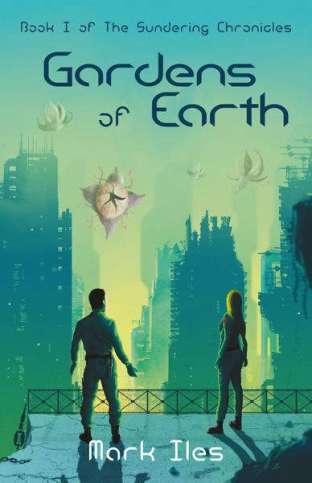
Isn’t the cover art fabulous? Book cover by the wonderful Alex Storer: The Light Dreams – Art and music by Alex Storer (wordpress.com)
Mark’s bio at the end:
1)
This is your first publication via Elsewhen Press. How have you found it?
Elsewhen Press have been really good. They are a very family orientated group and truly care about their writers. We meet up on zoom once a month to chat, I’ve not come across that before and it helps you to relate to them and the other authors. It’s been a great journey and I’m thoroughly enjoying the experience.
2) As far as I gather the plot for Gardens is quite a different voice and subgenre than your Lions series. More of a fantasy element. How different was it to write compared to your more military hard SF novels?
I found it quite hard but it was a story that was demanding to be written. I found the entire process a journey, where you discover different things and life takes you on varied tracks. I’m primarily a military science fiction writer, having served in the armed forces for many moons. However, the story developed a life of its own. Yes it’s SF, but it’s also horror, fantasy and romance. Everyone likes a little romance and, as we know, war breeds horror that can sneak up on you. I don’t think you can have a book about the subject without really covering it.
3) How has the COVID pandemic affected your writing routine and mindset? I didn’t think it bothered me but my wordage has definitely suffered.
I went down with covid quite early but at the time the doctors told me was that I had a lung virus. It was really a case of heal they self with paracetamol, etc. I was stuck in bed for weeks and struggled getting over it for a long time after. Even now I still struggle a bit with tiredness and being out of breath. I’m only now getting back into the flow, getting up and having breakfast, doing housework, before I start writing at around eleven am – finishing anywhere between two and four pm; though I do tend to give myself a break over the weekend.
Covid affected my writing quite badly. I was unable to focus or write for a long period of time. The irony for me was that, having gotten over it, not much actually changed for me. I live alone and so don’t see many people anyway. I really do feel sorry for those who have suffered through isolation from the pandemic though, particularly the children.
4) Moving house hasn’t helped for my writing mojo – plus cycling too fast round a corner and busting a collarbone. Have there been upsets in your situation that you feel able to tell us about that affected your writing?
I feel for you there. Moving house is stressful and I can only imagine how frustrating it must be, when you want to write and can’t.
My writing is often up and down. I’ve completed a book in less than six months, while others have taken several years. I found feature writing relatively easy and did that for years. Fiction is so much harder, particularly a series where you have to remember every little thing. It takes lots of research too, because if you screw it up your audience is sure to tell you.
5) How has being involved in the Help for Heroes related activities inspired or been detrimental to your writing?
I’d say inspired more than anything. If you can’t write then you can’t write, but doing courses and mixing with other veterans has a calming effect; plus you get to see people you often wouldn’t normally – and for me that was a really big deal.
Both H4H and Combat Stress help veterans with strategies to deal with their issues. For me, using writing as a means to get up in the morning with something to do helped tremendously.
One thing in particular that really helped was Mindfulness and ‘being in the moment’. Being out in the wilderness and stop to take stock of things really adds to the realism in your story, your ability to describe things more fully. The five things you can see, four you can hear, three you can touch, two you can small and one that you can taste – it really works.
My hope is that through reading this story people will not only enjoy it for what it is, but also gain a better understanding of veterans and their issues.
EXTRACTS in case you missed the first extract of Mark’s book, this is the link to ‘Gardens of Earth’ The Sundering Chronicles Book I (markiles.co.uk)
Extract from Mark Iles’ GARDENS OF EARTH: Book One of the Sundering Chronicles
Mrs M moved to stand next to him, automatically tightening her dressing gown as together they turned full circle to survey the carnage around them. People hurried past, their faces taught with terror. Somewhere gunfire rattled and people screamed, many of the cries cut short. There was an explosion, followed swiftly by another much larger, and even more gunfire and shrieks. The people were running now, their faces white with terror. The snap and chatter of gunfire sounded closer still, while overhead brilliant beams of energy flashed.
That crisp smell of winter carried an icy, bone-chilling terror that tensed Seethan’s muscles to the point of screaming while filling him with dread. Together they stood staring into the darkened streets, lit now only by flames and a few guttering streetlights here and there.
“Look,” Mrs M said, clasping her gown tightly as she pointed to a body lying in the snow-covered road. It was fresh, the blood still pooling, and as yet only lightly dusted by the falling ash. “Look what we’ve driven them to! It’s their home not ours, we should leave the Spooks to it and find somewhere else to colonise!”
“That won’t happen, you know it,” Seethan replied. “The colonisation industry has spent far too much money to let Halloween go now, they’ll want to recoup their losses. Politicians cock up, the military clean up. That’s always been the way of things.”
A convoy of military drones shot past overhead, spitting brilliant beams of blue energy into the darkness as they went. A man on fire staggered towards them from one of the doorways, screaming in agony before collapsing into the snow. He lay there smoldering, just another body in the wintery nightscape.
In the doorway something else moved. It was a deeper shadow in the semi-darkness and Seethan knew that there was someone there.
Some thing.
NOTE: The next instalment of Gardens of Earth is on the blog of Sarah Udoh Furthner here Blog (sarahudohgrossfurthner.com)
 Mark Iles Bio
Mark Iles Bio
Born and raised in Slough, Mark Iles began studying the martial arts when he was 14 and joined the Royal Navy at the age of 17. A voracious reader he used to devour up to three paperbacks a day – primarily science fiction, fantasy, and horror – by the likes of John Wyndham, Isaac Asimov, Arthur C. Clark, Ray Bradbury, Brian Lumley, Frank Herbert, Stephen King, and a plethora of others. After The Falklands War Mark was drafted to Hong Kong, where he began writing features, for a variety of martial arts magazines, and short stories for a wide range of markets. In 2012 he decided to challenge himself and undertook an MA in Professional Writing, followed by Diplomas in Copywriting and Proofreading. With over 200 short stories and articles under his belt the book he wrote for his MA Project, A Pride of Lions was published by Solstice – followed by two other novels, a short story collection, and four novellas. His latest novel, Gardens of Earth, book 1 of The Sundering Chronicles, is published by Elsewhen Press in August. Currently Mark is working on the second in the series, as well as another short story collection. Now a 9th Degree Black Belt in Taekwondo, Mark is still involved in martial arts and has also written both a book and an app on the subject.
Garden of Earth Buy Links:
Elsewhen:
Kindle links:
https://bit.ly/GardensOfEarth-KindleUK
https://bit.ly/GardensOfEarth-KindleUS
https://bit.ly/GardensOfEarth-KindleAU
https://bit.ly/GardensOfEarth-KindleCA
Others:
https://bit.ly/GardensOfEarth-Google
https://bit.ly/GardensOfEarth-iTunes
https://bit.ly/GardensOfEarth-Kobo
Books2Read:
https://books2read.com/GardensOfEarth
Social media links
http://www.amazon.co.uk/Mark-Iles/e/B004YZBP3I
The post Gardens of Earth #New scifi appeared first on Geoff Nelder - Science Fiction Writer.
June 8, 2021
When poop is beautiful – #butterfly
When bile is beautiful

Alt cover for Suppose We by Peter Baldiccino
In my SUPPOSE WE science fiction novel, the Chief Science Officer, Gaston, is enamoured by an alien butterfly he calls Papillon. The creature looks like a butterfly with the size of a Red Admiral, but it really is in a symbiotic connection with its owner, a Keplerian being. A kind of information gatherer. So, not a butterfly at all in spite of its “flying crooked” flight and lack of sound. In the story Papillon is a purple colour which made me wonder about real butterfly colours in general.
Butterflies are of the order Lepidoptera because Lepido means scales and Ptera means wings. (remember Pterodactyl?) Looked at closely, butterfly wings are scaled, like many insects. I’ve always assumed their colours come from the way the microscopic (nano) scale shapes absorb and reflect light coupled with pigment – if any- they derived as larva when they ate plants or as the winged adult which only drinks nectar or sap. This is mostly the case. However, they can add a more interesting element into their wing colours. Bile!
In humans bile is formed by the liver to aid the breakdown of fats. It’s stored in the gall bladder. Why butterflies need bile when they don’t eat fats is a puzzle though all creatures make some fats eg cholesterol that need breaking down at some point
Carotenoids especially lutein are yellow and red pigments, eaten by caterpillars and is mostly responsible for their green colour (wait for it). Lutein is what makes egg yolk yellow) You might think their eating the plant chlorophyll does that but apparently not so much. Something blue is needed to mix with the yellow lutein and blue pigments from bile.
So the colours of butterflies often come from a mix of chemicals they take in from plant juices, their scale nano geometry and poop juice, or bile. Lovely.
 Gaston loves Papillon so much that when he is separated from its Kep owner he is presented with his own Papillon clone, which is green. Now there are few green butterflies on Earth. The Green Hairstreak is one in Europe and the beautiful Malachite butterfly in the Americas. It’s good that I haven’t mentioned the nearly invisible Glasswing butterfly or I’d have to explain how its wings are transparent! Oops. I’ll let you think about that one.
Gaston loves Papillon so much that when he is separated from its Kep owner he is presented with his own Papillon clone, which is green. Now there are few green butterflies on Earth. The Green Hairstreak is one in Europe and the beautiful Malachite butterfly in the Americas. It’s good that I haven’t mentioned the nearly invisible Glasswing butterfly or I’d have to explain how its wings are transparent! Oops. I’ll let you think about that one.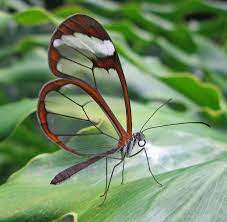
A link to more explanation of butterfly colouring with some stunning images is at the link below:–
To engage with Gaston’s experience of Papillon, read SUPPOSE WE and its sequels. Paperback and Kindle plus Kindle Unlimited.
The post When poop is beautiful – #butterfly appeared first on Geoff Nelder - Science Fiction Writer.
May 24, 2021
Ancient trees in my garden
This is the time of year that weeds are spotted and snarlingly eradicated. Before you lacerate the horsetail Equisetum plants just give it a little thought. Maybe even lie down on your lawn to look at them and imagine them twice the height of a house! Horsetails are the descendants of really ancient trees from over 100 million years ago. Many horsetails fell into swamps and became peat then coal. Their patterns can often be seen in coal today. (assuming you
lacerate the horsetail Equisetum plants just give it a little thought. Maybe even lie down on your lawn to look at them and imagine them twice the height of a house! Horsetails are the descendants of really ancient trees from over 100 million years ago. Many horsetails fell into swamps and became peat then coal. Their patterns can often be seen in coal today. (assuming you  can track down a lump).
can track down a lump).
The spacing of the nodes on the stems of horsetails increase in frequency towards the top, which inspired Leibnitz to invent logarithms.
They are marvellous plants but to look at only. Crushed and prepared horsetails have been used for centuries as a medicinal herb for slimming, hair, skin and bone health but there’s no evidence they work. Just enjoy their historical provenance.
 Gottfried Wilhelm Leibniz was a stupendously clever genius, a natural observer able to link natural phenomenon, such as the nodes on Horsetails to potential mathematical applications. From his logarithms followed other mathematics to create calculus. Leibniz was also so clever his first name was called after mine.(I was born Godfrey, which in German is Gottfried, only mother and my landlady in Sheffield called be Godfrey!)
Gottfried Wilhelm Leibniz was a stupendously clever genius, a natural observer able to link natural phenomenon, such as the nodes on Horsetails to potential mathematical applications. From his logarithms followed other mathematics to create calculus. Leibniz was also so clever his first name was called after mine.(I was born Godfrey, which in German is Gottfried, only mother and my landlady in Sheffield called be Godfrey!)
Other Nelder News Personal Best anthology in which is my Don’t Bite my Finger… short monk punk story. https://www.amazon.co.uk/dp/B08F6CGF9X
Personal Best anthology in which is my Don’t Bite my Finger… short monk punk story. https://www.amazon.co.uk/dp/B08F6CGF9X
Also published was ALIEN EXIT a science fiction first-contact novel as an ebook only https://mybook.to/alienexit
Revised Xaghra’s Revenge now retitled as Vengeance Island http://mybook.to/VIsland
Escaping Reality – humorous thriller • http://hyperurl.co/nyjaiv
Hot Air – thriller set in Mallorca • http://hyperurl.co/di4y0h
ARIA: Left Luggage – infectious amnesia scifi • smarturl.it/1fexhs
ARIA: Returning Left Luggage • http://hyperurl.co/tgtid6
ARIA: Abandon Luggage • http://hyperurl.co/26trxv
Incremental – 25 surreal short stories • http://mybook.to/Incremental
Suppose We -science fiction space exploration • https://mybook.to/SupposeWe
The Chaos of Mokii ebook at https://mybook.to/Kaos
Home • http://geoffnelder.com
Facebook • http://bit.ly/2DnAmRS
Twitter @geoffnelder
The post Ancient trees in my garden appeared first on Geoff Nelder - Science Fiction Writer.
April 9, 2021
The Garrick’s Head
We moved to Flixton in December 2020, a small township in Greater Manchester on the Lancashire / Cheshire border and just inside the former. It meant Mrs N had finally moved back to the county in which she was born. That wasn’t the reason: we moved to be closer to daughter and her brood who live in Urmston, two miles away.
We often walk to daughter’s house observing a new-to-us townscape, which includes the Flixton Cricket and Sports club, the site of a Roman road, the tip of a granite glacial erratic, the first hospital of the NHS (Trafford General), and The Garrick’s Head. I’d heard of the surname Garrick: there are at least five theatres carrying the name in the UK but I thought it might be a local dignitary of local significance as so many street names are. I did some digging and was astounded.
There was a public house here of that name in 1830, demolished in 1928. The present rather grand Tudor-style building was opened in 1936. What amazes me is that David Garrick wasn’t a film star or someone generally famous these days except with scholars. He was an eighteenth-century actor born 19 February 1717 – died 20 January 1779. He was such a brilliant actor every theatre in Britain wanted him on their stage and his portrait on their walls. (This was before photography, which didn’t become common for nearly a century later). This one by Thomas Gainsborough shows, perhaps, why Garrick became famous, and still is by theatrical scholars and drinkers. It shows warmth, joviality and calmness. Quite different from so many stiff portraits in those times. He was an outstanding actor but also a Drury Lane, London manager devising many special effects for the stage. However, what made me sit up was that someone could be so good in their job that his name lives on today. Yes I know other names survive but they’re prominent politicians, academics, scientists, military, artists, writers or royalty. A long list I suppose but still, it would be like if I was such a good teacher my name would decorate pubs in 250 years – not!

Portrait by Thomas Gainsborough
This isn’t all. David Garrick heard a singer on the stage who was such a warbler that he fell in love and married Eva Veigel. When David died at age 62 of a bad cold, his wife lived on for a further 43 years!
David Garrick was a pupil of Dr Samuel Johnson – the inventor of the English Dictionary. Such a lot happened in his life.
An information board at the pub tells us that in 1944 The Glen Miller band and world Heavyweight boxer Joe Louis stayed at the pub while on a good will visit to the Trafford General Hospital then called 10th Station Medical Hospital.
I hope others who walk during lockdowns or not find pleasure in picking at these kind of historical facets of our towns.
References:
His wife Eva Marie Veigel – Wikipedia
The pub website The Garricks Head – Friendly pub in Flixton (business.site)
Other Nelder News
Personal Best anthology in which is my Don’t Bite my Finger… short monk punk story. https://www.amazon.co.uk/dp/B08F6CGF9X
Also published was ALIEN EXIT a science fiction first-contact novel as an ebook only https://mybook.to/alienexit
Revised Xaghra’s Revenge now retitled as Vengeance Island http://mybook.to/VIsland
Escaping Reality – humorous thriller • http://hyperurl.co/nyjaiv
Hot Air – thriller set in Mallorca • http://hyperurl.co/di4y0h
ARIA: Left Luggage – infectious amnesia scifi • smarturl.it/1fexhs
ARIA: Returning Left Luggage • http://hyperurl.co/tgtid6
ARIA: Abandon Luggage • http://hyperurl.co/26trxv
Incremental – 25 surreal short stories • http://mybook.to/Incremental
Suppose We -science fiction space exploration • https://mybook.to/SupposeWe
The Chaos of Mokii ebook at https://mybook.to/Kaos
Home • http://geoffnelder.com
Facebook • http://bit.ly/2DnAmRS
Twitter @geoffnelder
The post The Garrick’s Head appeared first on Geoff Nelder - Science Fiction Writer.
March 26, 2021
String Theory for kids – fiction
Ages ago when my grandkids weren’t as wise as they are now, I wrote half a dozen illustrated children’s stories for them. Obviously, they were tinged with the Nelder surreal touch. Only one was professionally illustrated. She is Kathleen Bullock living in America and executed a fine job. Scoot is a young lad, loosely modelled on Oliver and Nathan. His name comes from his favourite vehicular pastime. He and his dog found the end of a piece of string and follows it through the village. Through shops, parks, woods and the library. What happens to it? Scoot has a theory – STRING THEORY.

Front cover of String Theory – WIP
The story idea came from a bike ride. I was riding from Llangollen to Chester one day when I saw a piece of red twine on the road. I followed it up hills and round bends until I encountered a council lorry. Sitting on the drop-down tailgate was a workman reeling in the twine! He said it wasn’t his but his boss had a report it might get caught in bicycle gears or strangle an old lady so he was sent out to collect it. Hence the idea for STRING THEORY.
Check out this marvellous sample page
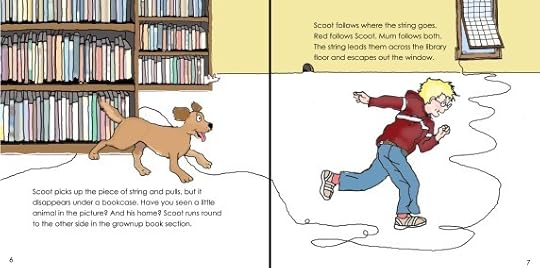
I’m experimenting with Payhip – a bit similar to ebay but just books and you pay with PayPal. For £2 or under $3 it’s yours to read on your tablet or other device to your young ones. Probably suit 5-9 years most though I enjoyed rereading it too.
Other Nelder News
Personal Best anthology in which is my Don’t Bite my Finger… short monk punk story. https://www.amazon.co.uk/dp/B08F6CGF9X
Also published was ALIEN EXIT a science fiction first-contact novel as an ebook only https://mybook.to/alienexit
Revised Xaghra’s Revenge now retitled as Vengeance Island http://mybook.to/VIsland
Escaping Reality – humorous thriller • http://hyperurl.co/nyjaiv
Hot Air – thriller set in Mallorca • http://hyperurl.co/di4y0h
ARIA: Left Luggage – infectious amnesia scifi • smarturl.it/1fexhs
ARIA: Returning Left Luggage • http://hyperurl.co/tgtid6
ARIA: Abandon Luggage • http://hyperurl.co/26trxv
Incremental – 25 surreal short stories • http://mybook.to/Incremental
Suppose We -science fiction space exploration • https://mybook.to/SupposeWe
The Chaos of Mokii ebook at https://mybook.to/Kaos
Home • http://geoffnelder.com
Facebook • http://bit.ly/2DnAmRS
Twitter @geoffnelder
The post String Theory for kids – fiction appeared first on Geoff Nelder - Science Fiction Writer.
March 23, 2021
Robots are vegan
Robots are vegan unless there are animal-based lubricants and other parts used. Aggressive AI would likely be vegan even if they have zero compunction on expunging organics if they get in the way. The laws of robotics are only relevant for readers of Asimov, which most aliens probably haven’t. Indeed, the AI armed drones in the middle east don’t obey Asimov’s laws either.
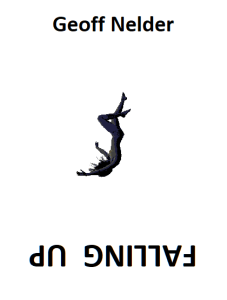 I’m only thinking aloud about this because a planetary system inhabited by AI beings / things capable of improving their own design and reproduction feature in Falling Up. If you thought the First Contact, science fiction novella, SUPPOSE WE was weirdly beautiful, just dive into its sequel, FALLING UP at
I’m only thinking aloud about this because a planetary system inhabited by AI beings / things capable of improving their own design and reproduction feature in Falling Up. If you thought the First Contact, science fiction novella, SUPPOSE WE was weirdly beautiful, just dive into its sequel, FALLING UP at
Decadal writing
2003-05 ESCAPING REALITY http://hyperurl.co/nyjaiv
2009 HOT AIR http://hyperurl.co/di4y0h
2009-12 ARIA LEFT LUGGAGE http://smarturl.it/1fexhs
2013 ARIA RETURNING LEFT LUGGAGE http://hyperurl.co/tgtid6
2014 ARIA ABANDONED LUGGAGE http://hyperurl.co/26trxv
2018 INCREMENTAL http://mybook.to/Incremental inc 25 shorts
2019 SUPPOSE WE, https://mybook.to/SupposeWe
2019 FALLING UP https://mybook.to/FallingUP
2020 VENGEANCE ISLAND http://mybook.to/VIsland
2020 ALIEN EXIT https://mybook.to/alienexit
The post Robots are vegan appeared first on Geoff Nelder - Science Fiction Writer.
March 20, 2021
Craig Meighan #blog hitchhiker
This week’s blog has been gatecrashed by a new, crazy, must-be-read author, Craig Meighan aided and abetted (what does that mean?) by his debut novel FAR FAR BEYOND BERLIN.
I will be interrogating this usurper but meanwhile here’s the blurb and bio.
Blurb
Even geniuses need practice
Not everything goes to plan at the first attempt… In Da Vinci’s downstairs loo hung his first, borderline insulting, versions of the Mona Lisa. Michelangelo’s back garden was chock-a-block full of ugly lumps of misshapen marble. Even Einstein committed a great ‘blunder’ in his first go at General Relativity. God is no different, this universe may be his masterpiece, but there were many failed versions before it – and they’re still out there.
Far Far Beyond Berlin is a fantasy novel, which tells the story of a lonely, disillusioned government worker’s adventures after being stranded in a faraway universe – Joy World: God’s first, disastrous attempt at creation.
God’s previous universes, a chain of 6 now-abandoned worlds, are linked by a series of portals. Our jaded hero must travel back through them, past the remaining dangers and bizarre stragglers. He’ll join forces with a jolly, eccentric and visually arresting, crew of sailors on a mysteriously flooded world. He’ll battle killer robots and play parlour games against a clingy supercomputer, with his life hanging in the balance. He’ll become a teleportation connoisseur; he will argue with a virtual goose – it sure beats photocopying.
Meanwhile, high above in the heavens, an increasingly flustered God tries to manage the situation with His best friend Satan; His less famous son, Jeff; and His ludicrously angry angel of death, a creature named Fate. They know that a human loose in the portal network is a calamity that could have apocalyptic consequences in seven different universes. Fate is dispatched to find and kill the poor man before the whole place goes up in a puff of smoke; if he can just control his temper…
The bio of Craig Meighan
Craig Meighan was born in Lanarkshire, in central Scotland. Both a keen drummer and a fan of science fiction, he grew up wanting to be either Animal from The Muppets or Douglas Adams. This has led to an unfortunate habit of smashing up his computer at the end of each writing session.
With the ambition of becoming a screenwriter, he attended film college in Glasgow. He spent a short time making corporate videos and then after attending one chance meeting, he accidentally joined the civil service. Intending to stay for one summer, he ended up staying for 12 years (so think carefully before inviting him round for tea).
He is too polite to say which of the killer robots, demons and other assorted antagonists that appear in his book, are based on his interactions with actual government ministers.
His first novel, Far Far Beyond Berlin, was written in the evenings, after work, every day for a year, at the end of which time his wife Jen convinced him it was time to finally leave the safety of the office job and pursue writing full-time. She cunningly incentivised him by promising that if he managed to get his book published, he could get a big dog.
Craig lives with Jen, just outside Glasgow, where they like to play softball, enter pub quizzes and do escape rooms. He is delighted to announce that they are expecting a greyhound.
Links
Book page on Elsewhen Press website: https://bit.ly/FarFarBeyondBerlin
Buy links:
Books to Read: https://books2read.com/FarFarBeyondBerlin
Apple iTunes: http://bit.ly/FarFarBeyondBerlin-iTunes
Google Play: http://bit.ly/FarFarBeyondBerlin-Google
Kobo: http://bit.ly/FarFarBeyondBerlin-Kobo
Kindle UK: http://bit.ly/FarFarBeyondBerlin-KindleUK
Kindle US: http://bit.ly/FarFarBeyondBerlin-KindleUS
Kindle AU: http://bit.ly/FarFarBeyondBerlin-KindleAU
Author’s Multimedia:
Twitter – @craigmeighan – https://twitter.com/CraigMeighan
Facebook – https://www.facebook.com/CraigMeighanAuthor @craigmeighanauthor
Instagram – @craig_meighan https://www.instagram.com/craig_meighan/
Sneaky questions from Geoff Nelder followed by sneakier answers followed by an excerpt.
How did you know that I was born close to Berlin and now you’re taking me back there with your novel? ie why Berlin?
It’s a very ambitious project, but we’ve thoroughly researched every potential reader and each person will get a different copy with the town that is closest to their birthplace. My friend Pete will be reading Far Far Beyond Sutton-on-Sea at this very moment.
In all seriousness, I love Berlin. You may be disappointed, as I’ve only set one short scene in a pub there just because I like the city. The words “Far, far beyond Berlin” are the start of the following chapter and I just thought it was a strong title. Most of the story takes place off-world, but I threw a German city in there for the simple reason that I really love to visit Germany. The food, the people, the architecture, the sport are all attractions, but a number of the cities just have really, unusually good atmospheres. Berlin is a fun place to be, although that being said, my characters don’t enjoy their time there at all.
I would say that Douglas Adams is my absolute all-time hero, but I’m not sure that covers it really. For me he’s the best writer in the genre. There are more good sci-fi ideas in thirty pages of Hitch Hiker’s Guide than in most people’s careers. Terry Pratchett is a huge influence too, as is Neil Gaiman. I’m a big fan of a writer named Tom Holt also. He’s like a clockmaker, so many intricate moving parts. When I started to write prose, I wanted to write like Tom Holt, but I just couldn’t. It’s not my natural writing style and I was just doing a poor imitation. I eventually found my own voice, but I was certainly heavily influenced by those four writers particularly.
3) There’s a white duck on your cover art. I have a butterfly on my Suppose We cover and it becomes a character. Does your duck feature in the story? 3b) My butterfly is alien and not really a butterfly – is that kind of surreal characterisation happen in Far Far Beyond Berlin?
He’s a goose technically (it’s hard to judge the size when they’re in space) and yes, he’s a hologram, so not a real goose – a digital goose. He’s named Graham the Gravity Goose and he’s a side character who gives somewhat odd safety information aboard a giant space station. He has a twin brother named Pete who also appears as a hologram.
I have added Suppose We to my reading list as it sounds great (I’m a fan of that very nice cover).
4) I’m fascinated by cover art and the artists. How did you find Gordon Miller and what kind of dialogue did you and Elsewhen have with him for the cover?
I didn’t originally have a plan for the cover, I was simply going to take my lead from the publisher. Before we got to that stage of the publishing process though, my brother-in-law Gordon Miller started an Instagram page, where he revealed a hitherto unknown talent for digital illustration. He was doing sci-fi style images and space scenes that were very cool. I messaged him and asked if he’d help me prepare some sketches to show Elsewhen the kind of thing I liked. I like stark, bold images, a minimalist approach, but as it was a humorous book, I wanted it to evoke things like Hitch Hiker’s Guide. The original Hitch Hiker’s Guide had a classic sci-fi cover, but with a little quirky element that set the tone of the book quite nicely. He had a number of different designs, all of which were really cool (I’ve sent some across so your readers can see what options we were working from.) We went back and forth on these for a few weeks and then I sent a selection to Elsewhen. They made a few suggestions and Gordon used these suggestions to produce the final image. I can’t draw to save my life, so I was in awe of the entire procedure.
5) Long may the writing mojo stay with you. When that mojo threatens to leave town is there an author you dip into for inspiration?
Not really, I find that when I am struggling, it’s terrifying to look at better writing than your own! So, writer’s block becomes reader’s block for me too, which is unacceptable! I love reading too much to allow it to continue.
When I’m stuck on writing my current project, I move to something else and try to keep going. I always have a few future projects that have five or six pages of opening written already because of days where I was stuck. I wrote a poem for the first time the other day, when I was stuck on a scene. I need to keep going, it needs to be habit/addiction or I’ll stop. I wasted a good few years being a man who talked about things he was going to write, now I’m extremely motivated to get them done.
I think the key to it is to not be a perfectionist on the first draft. If you write the wrong words today, they can be fixed tomorrow, but for now push the story forward and keep getting words down on the page. Blank pages can’t be edited, honed or improved. The time to become a perfectionist is once you’ve typed “THE END”.
There’s a quote by the writer C. Robert Cargill that I have on my desk, it’s in view every day while I’m writing. It goes:
“The most important thing in writing is to finish. A finished thing can be fixed. A finished thing can be published. A finished thing can be made into a movie. An unfinished thing is just a dream. And dreams fade if you don’t hold on tight enough.
So, finish the thing.”
So, every day I sit down and I try to finish the thing.
The previous excerpt can be read here.
 Far Far Beyond Berlin Excerpt
Far Far Beyond Berlin Excerpt
In the beginning, there was darkness. God said “Let there be light” and there was light.
And it helped Him find that thing He’d been feeling about for in the darkness.
Now He could see what He was doing, God set about creating the small blue planet, He moulded the core, shaped the crust, laid down the rocks and the soil. He created the grass and the hills; He made the lakes, the plants, the trees, the oceans and the seas.
Standing back and looking upon His creation, He frowned with His massive face. He saw that it was good, but ‘good’ is not ‘perfect’. He made the oceans and lakes a more brilliant blue. He made the grass greener, then, wanting to increase the greenness even further, He realised that as God he could just make ‘Green’ more green. After all, it was He who defined what ‘green’ was in the first place, having invented it earlier that morning.
He positioned two suns in such a way that the warm light would hit the surface evenly at all times.
Like all creative projects, there was a period of pointless tweaking. Leaves were reshaped, the grass blades thickened then thinned again, the consistency of sand went through about nineteen iterations and because He couldn’t decide which was best, He deployed all of them to different parts of the planet. Eventually, He felt comfortable to declare it finished.
When all was right with the new world He carefully, lovingly fashioned the tiny creatures and granted them life.
It was to be a faultless world without sadness, violence or disease. It was perfection. Eternal sunshine would light his idyll forever.
He called it Joy World.
Needless to say, it was a fucking disaster.
#End of excerpt
To read the next excerpt follow this link to the blog of Sarah Udoh-Furthner here
Thanks Craig, I can’t wait to read the whole thing. Can I have my blog back now?
The post Craig Meighan #blog hitchhiker appeared first on Geoff Nelder - Science Fiction Writer.
March 5, 2021
Riftmaster of Miles Nelson
Miles Nelson’s Riftmaster…is a new work of adventure and out-of-this-world  phenomenon you should read. Why? Let Miles tell you himself in this excerpt 3 of his blog tour via his publisher Elsewhen Press.
phenomenon you should read. Why? Let Miles tell you himself in this excerpt 3 of his blog tour via his publisher Elsewhen Press.
If you missed the previous excerpt here it is on the blog of Mark Iles www.markiles.co.uk/blog
EXCERPT 3 of the RIFTMASTER
How do you hold on to hope when you’re being repeatedly wrenched between worlds?
College student Bailey Jones is plucked from his world by a mysterious and unpredictable force known as the Rift, which appears to move people at random from one world to another. Stranded on an alien planet, he is relieved when he meets a fellow human, the self-styled Riftmaster, who is prepared to assist him. Although curious about his new companion’s real identity, Bailey hopes that, with years of experience of the Rift, this cosmic traveller can help him find a way to return to Earth. But first, as the two of them are ripped without warning from one hostile planet to another, Bailey must rely on the Riftmaster to show him how to survive.
Riftmaster, an adventure, an exploration, is concerned with loss, and letting go, while still holding onto your humanity and identity, even when life seems hopeless.
Extract: Bailey watched, the quiet growing into an uncomfortable awkwardness. For a moment his gaze flicked to the mountain-dweller’s tail wiggling with concentration, the next he was watching the expressions across his four-eyed face. Struggling to think of something to say that would break the tension, Bailey sucked in his breath and finally, warily, nudged the elephant in the room. “Do you know how I got here? Am I even still… on Earth?”
“Rift brought you here. And… no. Our world has no name, but your kind do not live here.”
“The Rift? What’s that?”
“All I know is what Riftmaster told me. Rift takes things from one world and puts them in another. At random.”
“How do I get back?”
The bowl over the flame had begun to steam. Seven-horn transferred some to another bowl, this one slightly less charred. He offered it to Bailey.
“You don’t.”
End of excerpt.
Next: Wow. the fourth excerpt can be reached at the blog of Sarah Udoh-Furthner here
 Biography
Biography
Miles Nelson was born and raised in the distant north, in a quaint little city called Durham. He studied video game design at Teesside University, graduating in 2018. Since then, he has taken a step back from coding to work on his writing career, and has since led several masterclasses with New Writing North.
He has been writing all his life, and although Riftmaster is technically his fourth novel, he likes to pretend the first three don’t exist. Whilst he is primarily a sci-fi writer who loves long journeys, strange worlds and all things space and stars, he has also had brief flings with the genres of fantasy and horror.
He often writes stories highlighting the struggles faced by the LGBTQ+ community, and tries to include themes of empathy and inclusivity in all he does. Even then, though, Miles stands firm in the belief that this is not the defining element of his stories. And although he tries to represent his community as best he can, these themes are never the main focus; because he believes that (in most cases) a person shouldn’t be defined by their deviation from standard norms.
Outside of scifi and fantasy, he has a deep-rooted fascination with natural history, and collects books told from unique perspectives (be they animal, alien, or mammoths from Mars). The older, the better; his oldest book is just about to turn 100!
He currently lives in Durham City with his husband, Chris, who so far seems unworried by Miles’ rapidly growing collections.
Questions from Geoff for Miles.
Miles! Before you inhabit my blog and further, you are required to provide the correct password. In this case the password is a set of responses to my piercing questions.
1) Everyone is said to have a book inside them. Is Riftmaster that book or is a limbering up for something quite different?
In a way, yes. Riftmaster is a story many years in the making, and it features characters and storylines I have known about for a long, long time. At the time I wrote it though, Riftmaster represented a lot of heavy feelings that I was carrying. It allowed me to think about, and put all my feelings into a new perspective, and eventually lead to me seeking treatment for depression. Now that Riftmaster is finished, though, my heart is filling up with new stories. So I wouldn’t say it’s the only one, nor will it be the last.
2) Lockdown should have made writing easier in some ways. However, we’ve not been able to go off travelling to a retreat to concentrate on writing without domestic distractions. How has it been for you?
For me, Lockdown hasn’t changed much. I work part-time in a supermarket, so I’ve still been going to work! In addition, we don’t really go on many getaways, at least not with the purpose of writing. Other than that, I’ve had plenty to do: freelancing jobs have been popping up here and there to keep me going, I finished two more novels, published Riftmaster along with another few short stories, and I illustrated my first book! Keeping myself busy encourages a feeling of normality, so I haven’t really stopped since the beginning of it all.
3) How has your fascination for Natural History found itself in your fiction? For example I have a butterfly become a character. Not a speaking part, obvs, or is it obvious?
I’ve actually got some books about talking insects! But that’s just my bizarre collection. My love of natural history manifests itself in a lot of ways, mostly small. Firstly, a lot of people have said that I write fantastic animal/alien characters, even those without the ability to speak. In addition, my creature designs are heavily influenced by creatures found in the real world in ways that you wouldn’t necessarily expect.
The Mountain-Dwellers are a fantastic example of this. At a glance their inspiration seems obvious; they are based on mountain goats, and with their short muzzles, thick fur, and squat body type they are perfectly suited to their cold environment. However, they have a tiny pair of extra eyes above their regular pair. Why? Well, these eyes are for sensing light alone, and by detecting even the faintest traces of sunlight, they can find their way even in the worst blizzard. Many small creatures living on Earth, such as triops, have a third eye with a similar function, helping them find their way through the sediment in muddy ponds. The Mountain-dwellers also possess large, padded feet which act as snowshoes and prevent them sinking into hard-packed snow. And in a world where stone and flint is buried beneath thick snow, their horns (which shed frequently) can be used to strike fires and craft tools.
Generally, I also have a few different creatures for each planet designed so that I can have the reasonable skeleton of a food web, and so that each world seems somewhat populated, thus leading us nicely into our next question.
4) Your character, Bailey, is transported to other planets. How much science goes into making those worlds credible?
Although the creatures are meticulously designed for their environment, the process of planets in Riftmaster are slightly less exciting to talk about. In order for Bailey and the Riftmaster to survive on the planets they find themselves on, there had to be some rules at play. Firstly, the Rift only takes them to life-bearing planets, meaning that they’ll never find themselves on a barren rock with no possible food sources. The climate, water quality, and the structure of life there, however, can vary wildly. I generally come up with answers for a few questions before I know what the planet is going to look like. Generally, I’ll ask questions such as: what’s in the soil? What color is the sky? What’s the climate like? Where can they find food/water?
Generally, when I know the answers to these questions, the plants, animals and terrain of the planet follow quickly.
In some rare occasions, a planet is simply based on a cool fact I heard once, rather than being scientifically credible. For example, did you know it supposedly rains diamonds on Neptune? The Riftmaster claims to have visited a planet where such a phenomenon took place. While their version of events is definitely embellished, the pressure on such a planet would have no doubt killed them in an instant, if the carbon-rich atmosphere hadn’t first.
It might not seem very scientific, but if it’s fun to read about, then it’s perfect for me.
5) How tempted were you to make the Riftmaster a Riftmistress?
Although a lot of people see ‘master’ as a specifically gendered term, I (and by extension the Riftmaster), chose it because it is a lot more neutral than its feminine counterpart. As you likely already know, the word ‘master’ is often used to describe someone who is highly experienced in a trade or art, regardless of their chosen gender. A woman can be a master blacksmith, for example, but the term ‘mistress blacksmith’ sounds quite strange, at least to me!
As the Riftmaster says in chapter 3: “I chose this name because it’s easy to translate between intergalactic tongues.”
Besides; the blurb, as well as all excerpts shown in this blog tour, seem to portray the Riftmaster in a relatively neutral light. So… Who’s to say the Riftmaster isn’t a woman?
Excellent answers. Thanks for inhabiting the Geoff Nelder blog.
Miles Nelson Links
Book page on Elsewhen Press website:
https://Books2Read.com/Riftaster
http://bit.ly/Riftmaster-iTunes
http://bit.ly/Riftmaster-KindleUK
http://bit.ly/Riftmaster-KindleUS
Social Media Links
Twitter: @ProbablyMiles
Blog: https://milesnelsonofficial.com
The post Riftmaster of Miles Nelson appeared first on Geoff Nelder - Science Fiction Writer.
January 15, 2021
Silence is broken
 Some of you might be wondering why I’ve not blogged since October 2020. No, I’ve not had Covid or some other debilitating disease unless you call moving house an ailment. In some ways it is: you certainly feel there is a disturbance in the Force when you put all your worldly belongings in a truck (after discarding half of it); the wretched, wrenching feeling when with your spouse in the car, you peer back at the home you’ve made for the previous 43 years; your grown-up kids who now have their own sprogs only knew that nest, so you hurt from abandonment issues on their behalf; objects that knew their place before now hide out of fear in the new home. (example: I needed to move the car at 0700 this morning so that scaffolders can get by – our ‘new’ roof needs fixing – but the -2.2 C frost had prettied the car windows. Before December 3rd I could place my hand on the de-icer and scraper blindfolded. This morning I stood perplexed in the kitchen, mentally travelling the new cupboards, shed, unopened boxes, drawers and bedrooms before realizing the de-icers were in the car. The frozen car. I put bubblewrap over the windscreen to prevent frosting. It froze to the glass obliging me to scrape bubble-wrap AND ice. I should have stuck to bubble-wrap as being only good for sex like in that scene in my Escaping Reality but that’s another story.
Some of you might be wondering why I’ve not blogged since October 2020. No, I’ve not had Covid or some other debilitating disease unless you call moving house an ailment. In some ways it is: you certainly feel there is a disturbance in the Force when you put all your worldly belongings in a truck (after discarding half of it); the wretched, wrenching feeling when with your spouse in the car, you peer back at the home you’ve made for the previous 43 years; your grown-up kids who now have their own sprogs only knew that nest, so you hurt from abandonment issues on their behalf; objects that knew their place before now hide out of fear in the new home. (example: I needed to move the car at 0700 this morning so that scaffolders can get by – our ‘new’ roof needs fixing – but the -2.2 C frost had prettied the car windows. Before December 3rd I could place my hand on the de-icer and scraper blindfolded. This morning I stood perplexed in the kitchen, mentally travelling the new cupboards, shed, unopened boxes, drawers and bedrooms before realizing the de-icers were in the car. The frozen car. I put bubblewrap over the windscreen to prevent frosting. It froze to the glass obliging me to scrape bubble-wrap AND ice. I should have stuck to bubble-wrap as being only good for sex like in that scene in my Escaping Reality but that’s another story.
Why move at all if it is so traumatic? I convince myself it isn’t so bad. My dad moved house every 2 years in his last dozen or so years. He called it extended holidays. Note the locations from one end of Britain to the other: Cheltenham Spa, Berwick-upon-Dee (seaside), Ledbury (small, pretty, historic town), Exmouth (seaside), Peebles (pretty Scottish tourist town). The reason for our relocation is to be close to daughter and her boys. Sure enough within days of moving to Urmston, Manchester, grandson (11) cycled to us on his way home from school to use our facilities including a glass of orange and a biscuit. House move justified! Yeay.
We’re still surrounded by boxes of our books. We can’t put them up on shelves until said shelves are on the walls. Can’t do that until walls are skimmed and painted. Can’t do that until replacement windows are in and new lounge fire, and old splintered bricks have been hammered out and replaced.
Hence the writing mojo went on holiday. I wish I could have gone on holiday with it but Covid… plus although I’m no DIY bod, my better half might need support dealing with so many tradespeople, quotes, repairing the repairs, and so on. However, over Christmas I found my WIP was drawing me to add a few hundred words each day. Kepler’s Son is the third book (treacle?) in the Flying Crooked series set on a faraway planet in the future. Marvellous for escaping the present-day Earth and its ghastliness.
I was so pleased to have kickstarted writing again albeit in small punches that I screen- dumped three chapters and played around with the image it created to produce a joke picture. I posted it on social media only for some friends thinking I really wrote like that!
dumped three chapters and played around with the image it created to produce a joke picture. I posted it on social media only for some friends thinking I really wrote like that!
This week I wrote less because an editing job came my way. An ex-Royal Navy man had a collection of ditties, skits, poems and short stories that he’s thinking of getting published. I found myself laughing as I sung some of the shanties and discovered aspects of being in the Falklands conflict and the far East. Thanks.
Happy New Year to all writers and readers on this planet and others.
Other Nelder News
 A modern woman is descended from pirates while her lover came from their abductees? Or the other way round?
A modern woman is descended from pirates while her lover came from their abductees? Or the other way round?
Vengeance Island is set in Malta, Gozo, France, Libya, and a harem in Constantinople.
Personal Best anthology in which is my Don’t Bite my Finger… short monk punk story. https://www.amazon.co.uk/dp/B08F6CGF9X
Also published was ALIEN EXIT a science fiction first-contact novel as an ebook only https://mybook.to/alienexit
Escaping Reality – humorous thriller • http://hyperurl.co/nyjaiv
Hot Air – thriller set in Mallorca • http://hyperurl.co/di4y0h
ARIA: Left Luggage – infectious amnesia scifi • smarturl.it/1fexhs
ARIA: Returning Left Luggage • http://hyperurl.co/tgtid6
ARIA: Abandon Luggage • http://hyperurl.co/26trxv
Incremental – 25 surreal short stories • http://mybook.to/Incremental
Suppose We -science fiction space exploration • https://mybook.to/SupposeWe
The Chaos of Mokii ebook at https://mybook.to/Kaos
Home • http://geoffnelder.com
Facebook • http://bit.ly/2DnAmRS
Twitter @geoffnelder
The post Silence is broken appeared first on Geoff Nelder - Science Fiction Writer.



